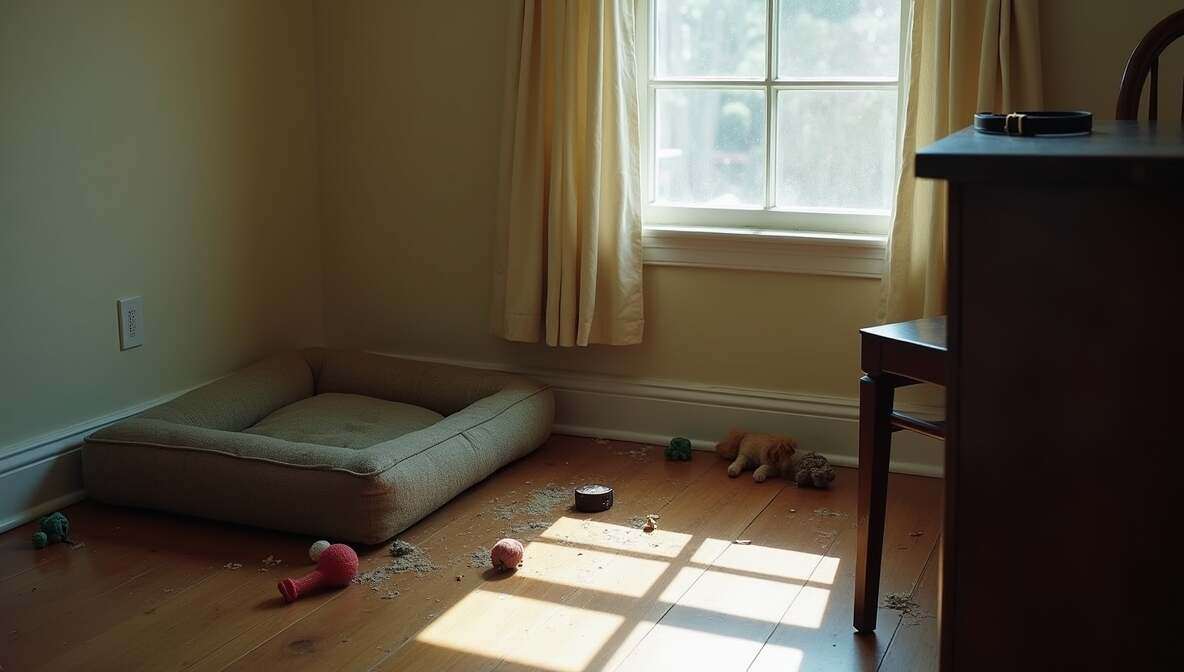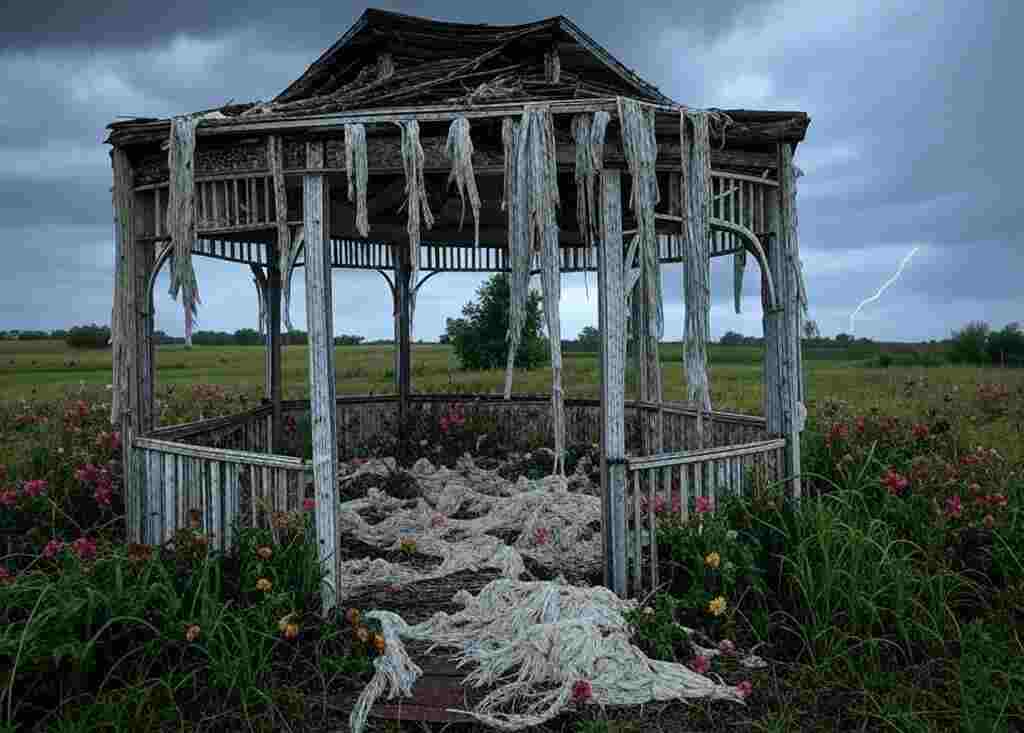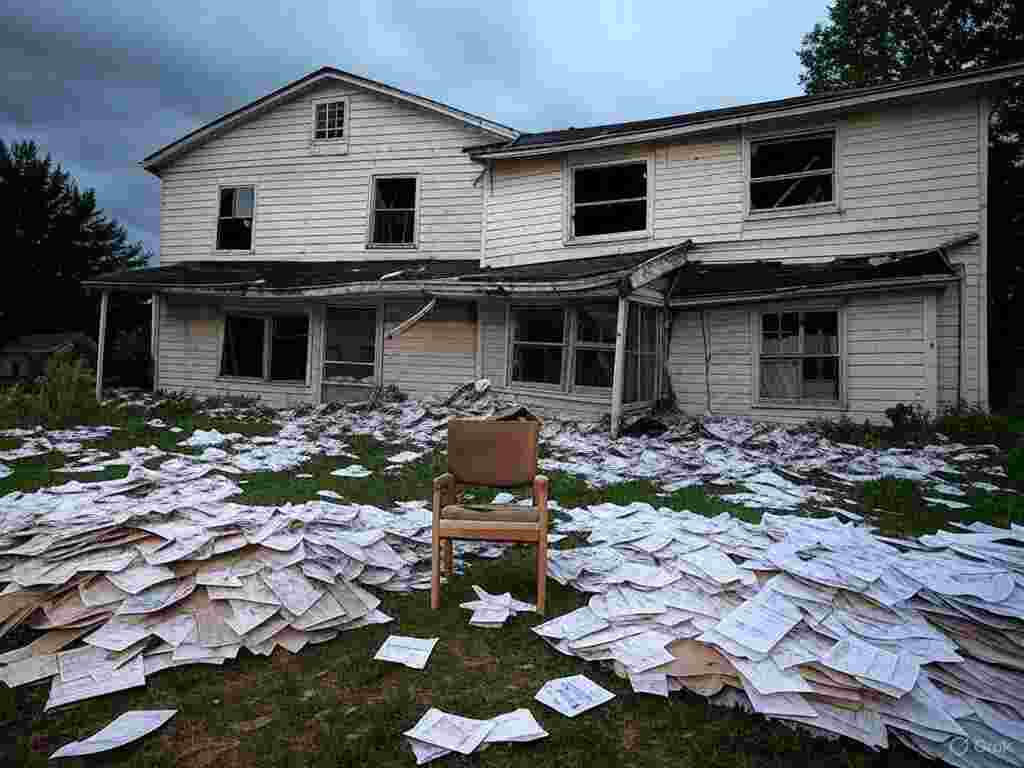Grief Doesn’t Heal—
It Demands a Room of Its Own
Grief does not lessen with time. It thickens.
It builds walls inside you, quietly constructing rooms out of what’s been lost. You can deny its presence, but it won’t dissolve. Instead, it deepens, embedding itself into corners of your life that others never witness. Not out of cruelty, but necessity—because emptiness must fill itself somehow.
You’ve chosen to come here, willingly stepping toward the grief you’ve been holding at bay. Here, denial fractures and breaks apart beneath honesty’s unbearable weight. There’s no softness waiting within these walls—only stark confrontation.
Each category below holds a unique devastation, stripped of pretense. These stories do not promise comfort; they promise clarity. They will press into your wounds, exposing pain in its rawest form.
You’re here because something shattered and pretending grew too exhausting.
Step inside the rooms grief has built, and finally admit what’s broken.

Grief for Grandparents Leaves Quiet Voids No One Fills
Losing grandparents fractures your foundations silently, deeply. These stories stare back, naming absences you’ve struggled to admit.
Grief for grandparents is quiet, almost invisible—but it settles into you deeply. It’s the unnoticed emptiness, the unspoken realization that something fundamental has been erased. A steady presence now replaced by absence.
This grief doesn’t shout; it whispers into family gatherings, familiar scents, old photographs. You’ll notice it in stories left half-told, in traditions quietly abandoned. It’s not dramatic. It’s subtle devastation, reshaping your memories into spaces that hurt to revisit.
Here, you won’t find comfort or promises that one day these voids will close. Instead, you’ll find acknowledgment: recognition of exactly what’s gone. You’re here because loss demands confrontation—quiet, honest, and painfully clear.
This is where you face the empty chairs, the silent phone, the truths you’ve quietly avoided. This is where grief waits for you, unapologetically.
Grief for Parents Leaves You Unanchored, Raw, and Quietly Lost
Losing parents fractures your sense of self, quietly leaving you adrift. These stories expose truths no comfort can conceal.
Grief for parents doesn’t merely hurt—it quietly unravels the core of who you believed you were. It’s the silent realization that your anchors have vanished, leaving you untethered, exposed, uncertain. A loss that dismantles your sense of permanence and protection.
It’s not loud. It’s quiet devastation—felt in moments of routine, in advice unspoken, in phone calls you can no longer make. The silence fills your days, sharp and relentless. Each absence weighs heavy, reshaping how you see the world and yourself.
In this place, there are no reassurances. You won’t find promises of clarity or closure—only honest confrontation of the emptiness left behind. You’re here to admit exactly how much has broken, how deeply you’ve fractured.
Face what’s missing. Acknowledge the rawness. Feel the quiet unraveling of everything you’ve known.
Grief for a Child Breaks Everything—Quietly, Permanently, Completely
Losing a child is grief without resolution, quietly shattering every truth you held. These stories confront what can’t ever be repaired.
Grief for a child is not just loss—it’s destruction, quiet and absolute. It dismantles every assumption about life’s order, leaving behind emptiness that refuses consolation. This grief doesn’t fade; it settles deeper each day, carving itself permanently into who you’ve become.
The pain isn’t loud—it whispers through birthdays uncelebrated, milestones unmet, futures unfulfilled. It’s a devastation that rearranges every hope, every expectation. It fills you with questions no answer could ever satisfy.
In this space, you won’t find promises of peace or recovery. Instead, you’ll face what feels impossible to accept—the silent, unbearable weight of absence. You’re here because the pretending became too exhausting, too dishonest. Because grief for a child demands confrontation, raw and unfiltered.
Let yourself see it clearly: what’s lost, what’s broken, what won’t ever return.
Sibling Grief Leaves a Quiet, Aching Gap Nothing Replaces
Losing a sibling fractures the silent bonds you took for granted. These stories confront the spaces no comfort reaches.
Grief for a sibling is subtle and relentless. It quietly reshapes your world in ways others rarely see or acknowledge. It’s the permanent silence where there once was understanding, companionship, and shared history—a loss that steals your sense of continuity.
This grief doesn’t announce itself loudly; instead, it settles into everyday moments. It’s the empty side of conversations you still try to have, jokes unfinished, rooms that remain stubbornly quiet. Sibling grief is the constant ache of what’s abruptly missing, an absence felt but rarely spoken about
You won’t find comfort here. There are no assurances of moving past this or filling the emptiness. Instead, you’re here to acknowledge the starkness of your loss, the truths you’ve quietly buried beneath forced normalcy.
It’s time to stop pretending nothing changed. Step into this grief, clear-eyed and honest.
Grief for a Dog Leaves Quiet Holes No One Understands
Losing a dog quietly fractures daily routines, leaving silent emptiness behind. These stories confront losses others underestimate.
Grief for a dog settles quietly into every corner of your day, carving silent holes where routines once lived. It’s the emptiness at the door, the untouched leash, the unbearable quiet where paws once echoed. This grief isn’t dramatic, yet it dismantles your ordinary moments—one after another.
To others, it might seem small, easily resolved. But you know better. Dog grief is the loss of loyalty, silent companionship, and simple joys that anchored you daily. It’s felt deeply in walks no longer taken, beds empty of warmth, and familiar comfort replaced by aching absence.
Here, there’s no promise of consolation. No gentle encouragement to move on or fill the void. Instead, you’re asked to acknowledge exactly how much has disappeared, how deeply your days are altered.
Face the empty spaces your dog left behind. Admit that something quietly broke—and it’s not fixable.
Cat Grief Leaves Quiet Absence in Every Familiar Place
Losing a cat quietly dismantles daily comfort, leaving spaces too raw to ignore. These stories confront losses others overlook.
Grief for a cat settles silently, disrupting comforts you rarely noticed until they vanished. It’s the quiet emptiness in the sunlit spots, the lingering silence in rooms once softly animated by their presence. It fractures your daily rituals, leaving subtle but relentless reminders of what’s gone.
This grief isn’t loud. It’s measured in quiet mornings no longer greeted by soft paws, routines disrupted, and the absence of companionship that felt effortlessly understood.
Cat grief is an aching space, a silent loss that others may struggle to appreciate fully.
You won’t find comfort or gentle assurances here. Instead, you’ll face clearly and honestly what has broken: the quiet corners, the empty spaces, the daily rhythm quietly unraveled.
Stop pretending the silence isn’t painful. Acknowledge exactly what your cat took with them.
Grief for a Romantic Partner Cuts Deep in the Quietest Moments
Losing a partner dismantles your everyday life without warning. These stories confront the silence where love used to live.
Grief for a romantic partner isn’t just heartbreak—it’s disorientation. It strips away the daily structure of your life, removing the one person who knew your rhythm, your rituals, your silence. What’s left behind isn’t just pain—it’s absence woven into everything.
This grief isn’t loud. It doesn’t scream. It settles—into empty beds, unread messages, the instinct to share something you no longer can. It lingers in the small, automatic gestures that now go unanswered. The world may keep moving, but everything intimate has stalled.
You won’t find hope here. You won’t find light. Only acknowledgment of how completely the loss of a partner unthreads your sense of being known.
This is where you admit it: the silence is unbearable, and no one else will ever speak to you in exactly the way they did.
Heartbreak Grief Lingers Where the Love Refused to Stay
Heartbreak grief isn’t just about loss—it’s about what’s left behind. These stories confront the ache that doesn’t need death to be real.
Heartbreak is grief—real, raw, and often dismissed. It’s the quiet collapse of a future you once counted on, the unraveling of something that was supposed to last. It doesn’t require death to feel like loss. It just needs absence—and the refusal to be chosen.
This grief lives in the in-between. The messages that stopped coming. The plans that won’t be realized. The love you still feel, even when it’s no longer returned. Others may tell you it wasn’t that serious, or that you’ll move on. But you know better. You feel what’s been broken.
Here, no one tells you to get over it. No one rushes your ache. Instead, this space holds the wreckage for what it is—valid, brutal, and unfinished.
You’re not here for comfort. You’re here because you still feel it, and you’re ready to stop pretending it didn’t destroy you.
Loss of Health Grief Quietly Dismantles Who You Used to Be
Grieving your health means mourning parts of yourself still technically alive. These stories name the losses no one else acknowledges.
Grieving the loss of your health means watching pieces of yourself disappear without ceremony. It’s not just physical—it’s psychological. It’s the shift from what was normal to what is now necessary. It’s mourning a version of yourself others still expect you to be.
This grief doesn’t draw attention. It doesn’t scream. It shows up in quiet humiliations, altered plans, and the constant recalculating of your limits. It wears you down not just with pain or exhaustion—but with the silence surrounding it. Because few recognize the weight of losing something you still technically have.
You won’t find hope here. You won’t be told to fight or stay strong. This space was built to name what’s been taken, and to let the ache speak clearly.
You’re here because part of you is gone. Not in memory, but in function. Let that be acknowledged.
Grief from Miscarriage and Infertility Is Silent, but Suffocating
This grief lives in what never arrived and what may never come. These stories confront the emptiness others try to ignore.
Grief from miscarriage and infertility is a quiet kind of devastation. It’s grief for what was hoped for, what was imagined, what was supposed to be. It’s mourning something that never had the chance to fully exist—and still somehow takes up space in every corner of your life.
This grief isn’t often recognized. It’s brushed aside, minimized, wrapped in platitudes that only deepen the ache. But it’s real. It’s raw. And it doesn’t let go just because others can’t see it.
You won’t find soft words here. You won’t find promises. This space doesn’t offer meaning or silver linings—it offers truth. The truth that something is missing. That something didn’t arrive. That your body or your future betrayed you, and the world kept going like nothing happened.
You’re here because that silence became unbearable. Let it break open.
Losing Your Identity Isn’t a Shift—It’s a Quiet Collapse
When who you were no longer exists, grief follows. These stories confront the silent disintegration of selfhood.
Grief for identity isn’t always triggered by a single event—it’s the quiet collapse of who you thought you were. It’s the moment you realize you no longer recognize yourself, and worse, no one else notices the change. You’re still here. But not as you.
This loss doesn’t scream. It lingers in disconnection—in your reflection, in your decisions, in how you move through rooms that once made sense. It’s the disorientation of watching your past self fade, with no clear replacement stepping in. A version of you has died, and there’s no language for that.
Here, there is no pressure to redefine or rebuild. This space isn’t for reinvention. It’s for reckoning. For standing inside what was lost and saying it plainly: I’m not who I was. And I don’t know what’s left.
You’re here because you feel the hollowness—and you’re done pretending it’s growth.
Grieving Lost Dreams Feels Like Failing a Life You Never Got to Live
When your dreams die quietly, grief takes their place. These stories confront the ache of what never became real.
Grief for lost dreams is invisible, but constant. It’s not about what happened—it’s about what never did. The job, the path, the version of your life that once felt within reach but slowly, silently slipped out of it. Not with finality, but with delay that turned into disappearance.
This grief isn’t loud or dramatic. It builds in quiet corners—in the milestones missed, the comparisons you try not to make, the moments that remind you of what could’ve been. It’s a grief that often feels like failure, but goes deeper than that. It’s the death of a vision you built your life around.
No one mourns it with you. There’s no language for grieving possibility. But the ache is real. And it’s time you stopped minimizing it.
You’re here because something you needed didn’t happen. Something that mattered. And the grief didn’t leave just because you kept going.
Losing a Job or Business Quietly Shatters the Life You Built
This grief doesn’t just take income—it takes identity, purpose, stability. These stories confront what no résumé can explain.
Grief after losing a job or business is rarely named, but it runs deep. It’s not just financial—it’s personal. It’s the collapse of something you built, believed in, or relied on. It’s the daily rhythm suddenly gone. The purpose, the pride, the control—stripped away without ceremony.
This kind of loss doesn’t get rituals. It doesn’t get sympathy. You’re expected to bounce back, reframe, update your profile. But underneath, something broke. Something meaningful. And the world rarely stops to ask what it took from you.
This space does. Not to fix, not to encourage—just to name what was lost. The identity tied to your work. The structure you depended on. The quiet unraveling that followed.
You’re here because the ground shifted beneath you. And you’re done pretending it didn’t matter.
Financial Grief Is the Quiet Panic No One Talks About
When money disappears, grief takes its place—quiet, constant, consuming. These stories confront the ache behind the numbers.
Financial instability isn’t just stress—it’s grief. It’s the slow erosion of dignity, choice, and safety. The constant mental math. The decisions made from fear, not freedom. It’s losing not just money, but the life it made possible. The options. The ease. The version of you who didn’t have to worry this way.
This grief doesn’t get named. It gets buried under shame, masked with hustle, dismissed with advice. But it cuts deep. It changes how you move through the world, how you see yourself, how safe you feel doing even the smallest things.
There’s no comfort here. No false silver lining. Just space to admit what’s been lost when the money ran out—and how much more than money it really was.
You’re here because you’ve been carrying this quietly. Let it be seen now.
Grief After Losing a Home Is Displacement That Doesn’t End
Home isn’t just a place—it’s identity, safety, belonging. These stories confront the grief of being unrooted and unseen.
Losing a home is more than losing shelter. It’s losing a part of yourself. The place that held your routines, your memories, your sense of control. The walls that made you feel safe. The door you could close behind you. When that’s gone, what’s left isn’t just inconvenience—it’s grief.
This grief doesn’t always show itself. It comes as disorientation. As shame. As the hollow ache of not knowing where you belong anymore. It’s the feeling of being exposed in ways you can’t explain to people who still have somewhere to return to.
You won’t find comfort here. Just honesty. The kind that names the loss without softening it. You’re not here because you want to move on—you’re here because something foundational was taken, and pretending it was just a “move” doesn’t work anymore.
This is where you stop downplaying what it did to you.
Grief for Friends Cuts Deeper Than Anyone Expects
When friendships break or disappear, grief settles in quietly. These stories confront the loss others often minimize.
Grief for friends is often dismissed, but it hits where you least expect. It’s the sudden quiet after daily texts. The seat left open at gatherings. The shared language that no longer has anyone to speak it. It’s losing someone who wasn’t family—but felt like they were.
This kind of grief is hard to explain. It doesn’t come with rituals or recognition. There’s no formal goodbye, no expected mourning period. But it leaves you fractured all the same—questioning your worth, your memories, your place in their story.
Here, no one minimizes what you lost. No one tells you it was “just a friend.” This space exists to name the pain for what it is: real, deep, and quietly devastating.
You’re here because something ended—and it mattered more than anyone realizes.
When Faith Is Shaken, Grief Fills the Silence
Grief tied to faith is a quiet rupture. It’s not always a loss of belief—it’s a break in trust. A moment where the plan no longer makes sense, where prayers go unanswered, and where the comfort you once leaned on starts to feel out of reach. It’s not about walking away from God. It’s about not knowing how to face Him when everything hurts.
This grief doesn’t mean you stopped believing. It means something inside you broke, and the silence after the breaking feels unbearable. You still want Him close—but you’re angry, confused, and unsure of how to speak now.
Here, you’re not asked to find peace or clarity. Just to stand in the space between betrayal and longing. This is grief where faith lives. Not because you’ve lost it—but because it matters that much.
You’re here because you still believe.
And because right now… that belief feels like it’s breaking you.
When the World Stops Pretending It’s Fair
This is grief without a single name—because it has too many.
It’s the weight of injustice piling up until it breaks something in you.
The mass shootings. The stolen rights. The politicians who lie and leave people to suffer. The silence after another preventable death. The cruelty repackaged as policy. The helplessness of watching it happen again—and again—and again.
This isn’t about personal loss. It’s about collective collapse. About knowing too much and still being expected to function. About screaming into a system that keeps rewarding the people who make it worse. It’s the grief of witnessing, day after day, how brutal the world can be—and realizing how few people are actually listening.
There are no silver linings here. No resilience. No peace.
You’re here because you’re tired of pretending this is normal.
Because it’s not. And it never fucking was.








